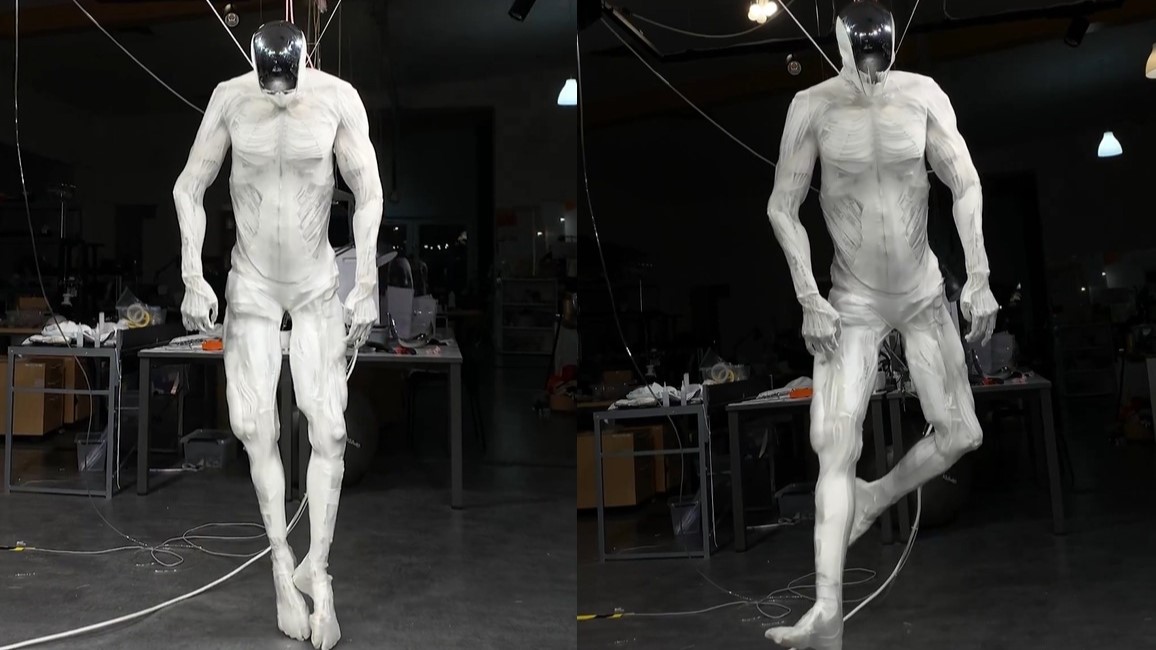Humanoid 'Protoclone' robot twitches into action while hanging from ceiling in viral video
Protoclone, an eerily lifelike humanoid robot built for home use, has left social media users aghast. And it's likely to be the first of many.

A robotics company has built an eerily lifelike humanoid robot which they claim is the "world's first bipedal musculoskeletal android" — and the internet hates it.
Created by Polish startup Clone Robotics, the "Protoclone" robot is a faceless android with an anatomically accurate bone structure and musculature. The android's designers claim it can walk, talk and be tasked with completing menial household chores.
In a video posted on X, which quickly went viral (with over 34 million views as of Jan 21.) the robot is shown twitching to life as it's suspended from the ceiling, its limbs jerking and spasming as artificial muscles attached to specific bone points come online, enabling the skeleton to move.
Related: Chinese humanoid robot is the 'fastest in the world' thanks to its trusty pair of sneakers
"The Protoclone is a faceless, anatomically accurate synthetic human with over 200 degrees of freedom, over 1,000 Myofibers [artificial muscle fibers], and 500 sensors," Clone Robotics wrote beneath the video.
Yet while the company appears ebullient about its technological achievements, social media reactions have ranged from disdain to outright hostility.
"This is my sleep paralysis demon," one commenter wrote. "WestWorld was nonfiction," someone else added. "Can you just draw a smiley face on the head, please?'" requested another.
Sign up for the Live Science daily newsletter now
Get the world’s most fascinating discoveries delivered straight to your inbox.
Protoclone, the world's first bipedal, musculoskeletal android. pic.twitter.com/oIV1yaMSyEFebruary 19, 2025
Rise of the robots
According to Clone Robotics' webpage, the android operates with human-like muscular, skeletal, vascular and nervous systems. It has 206 bones, the same number as adult humans, made from polymers connected by artificial muscle fibers, which it flexes using a pneumatic system (although the company says the final product will run using a hydraulics). To navigate its environment, the robot uses a system of sensors linked to four cameras.
The robot is the latest in Clone Robotics' range of biomimetic products, which also include a robotic hand and a humanoid torso. The company says that the android will be available for preorder later this year. No price is currently listed.
Protoclone is far from the only humanoid robot capturing the attention of businesses and the public. The California startup Figure tested its humanoid robots in a BMW factory in 2024, and has plans for introducing more this year. Apptronik, a Texas-based competitor, is also commercializing its humanoid robot, Apollo, for use in Mercedes-Benz factories by the end of the year. Meanwhile, Agility Robotics' Digit robot is also planned to be introduced into warehouses this year.

Ben Turner is a U.K. based staff writer at Live Science. He covers physics and astronomy, among other topics like tech and climate change. He graduated from University College London with a degree in particle physics before training as a journalist. When he's not writing, Ben enjoys reading literature, playing the guitar and embarrassing himself with chess.
You must confirm your public display name before commenting
Please logout and then login again, you will then be prompted to enter your display name.









